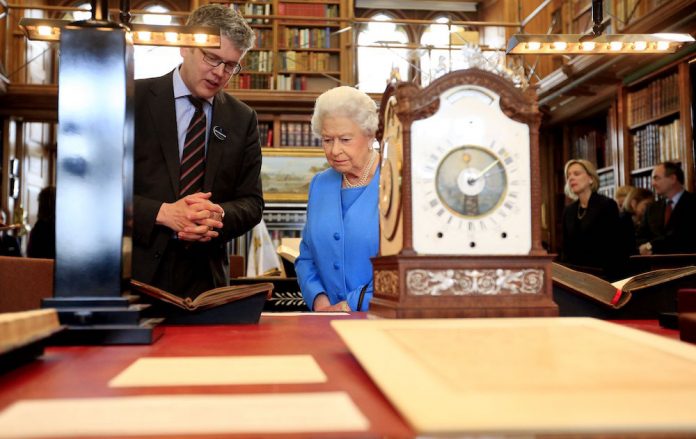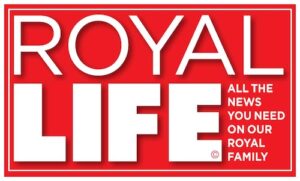
The Georgian Papers Programme
Reappraising George III
Placing the Royal Archives’ substantial Georgian papers collection online, for anyone anywhere in the world to access, marks a transformation in the interest, study and understanding of this crucial period in British and world history. Using 21st century technology to shine new light, colour and context on history, the portal will allow a reappraisal of, and bring new insights to, a complex, engaged polymath and highly informed Monarch. George III is often labelled as ‘mad’, or the King who lost America. Over the next four years, the Georgian Papers Programme – collaboration between Royal Collection Trust and lead academic partner King’s College London – promises to reveal many more dimensions to Britain’s longest reigning King and his family. A BBC Two documentary George III – The Genius of the Mad King has followed the early phases.
On January 28, 2017 a new global online portal will be launched officially, allowing the public and scholars alike a unique window into the life, reign and times of King George III, his impact then and his continuing influence on today’s world. It marks a major milestone in a five year project to enable anyone with an interest in George III to discover the intricacies of his life, reign and the contemporary times.
By 2020, the portal www.royalcollection.org.uk/georgianpapers will enable people to enter a remarkable collection of 350,000 papers from the Georgian period, only 15% of which have ever been published before.
They include intimate letters between The King and Queen Charlotte, Household bills, menus, as well as copious letters between The King and his government, his many essays – including on despotism – meticulous, detailed notes about the war in America, and lucid, calm letters to family during his bouts of illness.
Since 1912, the papers have been stored, with restricted physical access, within the Royal Archives in Windsor Castle’s Round Tower.
From January 28, the first 33,000 digitally photographed pages will be published online and open to anyone to access, enabling academics, students and history lovers worldwide to see George III, Britain’s longest reigning King from 1760 to 1820, from new perspectives.
The Georgian Papers Programme (GPP) is a partnership between Royal Collection Trust, lead academic partner King’s College London and international participants, including primary U.S. partners the Omohundro Institute of Early American History & Culture and William & Mary, as well as other key U.S. institutions such as the Library of Congress, Mount Vernon and the Sons of the American Revolution.
With Her Majesty’s full authority, the project is part of Royal Collection Trust’s objective to increase public access to and understanding of primary source material held in the collection. It follows the success of the digitisation of Queen Victoria’s journals in 2012, which has encouraged wide public appreciation.
The GPP was launched in the presence of Her Majesty The Queen at Windsor Castle in April 2015. Since then, acclaimed documentary producer John Bridcut and writer and presenter Robert Hardman have been following the initial stages of the project.
Their film George III – The Genius of The Mad King will be broadcast on BBC Two at 9pm on January 30. It follows academics from King’s College London and the Omohundro Institute eagerly opening boxes of papers never before properly explored. The documentary shows experts beginning the process of discovery:
Revealing that George III had a network of private agents. One, code-named Aristarchus, a ‘Georgian James Bond’, asking for payment for the intelligence that the French were plotting to assassinate the King as he walked at night in The Queen’s Garden.
A draft of Abdication, covered in blotches and scratchings, during the political crisis of March 1783 amid the difficulties in forming a Government. It was never deployed.
Several dated and immaculately time-coded letters between the King and Ministers over one day, a Sunday, during that same crisis
An instruction manual on Kingship written by George III’s father for his 10 year old son.
George III’s drawings and calculations of the Transit of Venus across the sun on June 23, 1769 and his – accurate – forecasts of further transits in 1874 and 2004.
Instructions from The King to Captain Cook before his ground breaking voyages
Poignantly, finding an almost pristine lock of hair taken from Prince Alfred before he died aged 1 year and 10 months in 1782, sewn in to a letter from Queen Charlotte to the children’s long-serving nanny Lady Charlotte Finch
Andrew Lambert, Laughton Professor of Naval History at King’s College London, tells the documentary: “The King takes his job very seriously. He is processing knowledge on a proto-industrial scale as a part of his role. He’s the best informed Chief Executive this country has ever had.”
Sir Simon Wessely, President of the Royal College of Psychiatrists and Regius Professor of Psychiatry at King’s College London, tells the programme that we may never know exactly what was wrong with George III, it may have been hypomania, but breakdowns often came amid turmoil at home, including the premature death of his youngest daughter Princess Amelia from tuberculosis.
Arthur Burns, Professor of Modern British History at King’s College London and Academic Director for the Georgian Papers Programme at King’s, says that the papers reveal how George III’s exercise of Kingship reflected his strong sense of commitment to the nation and both self-examination and serious reflection on what it mean to be a ‘good King’.
Andrew O’Shaughnessy, Professor of History at the University of Virginia and the first of five visiting Sons of the American Revolution GPP Professors to visit Windsor, talks about papers revealing George III’s ‘voracious interest’ in every detail of the war in America, from how many soldiers and blankets were required, to recording every detail of the French fleet, including canons, in his own hand.
Launching the GPP Portal, Oliver Urquhart Irvine, the Librarian and Assistant Keeper of The Royal Archives said: “Her Majesty fully supports the work currently underway to make the historic treasures of the Royal Archives widely accessible to the world through digital technology. This enables us to open to the many, what was previously only accessible to a few. Seeing original documents is utterly compelling. You can feel the passion, personality, worries and triumphs of individuals who have shaped major events. It can change your perspective on history.”
He explained that the GPP academic partners have established a series of more than 50 visiting graduate and undergraduate fellowships and five visiting professorships, based at the Royal Archives to support the programme over the coming years.
In the last 12 months, the Round Tower floor has been refitted to allow the digitisation, cataloguing and conservation work for the Georgian Papers Programme to begin. Further refurbishments have created a new research room, open five days a week, increasing capacity to support external research from 500 hours a year to 6000 hours a year, a twelve-fold increase.
Dr. Joanna Newman, Vice President (International) King’s College London and the college’s GPP lead said: “We are only just starting to explore this amazing resource and the opportunity for reinterpretation and scrutiny of many aspects of 18th and early 19th century life, political, social and economic, as well as seeing George III through more informed perspectives. He was fascinated by science. The Industrial Revolution happened on his watch. It’s appropriate that George III is now breaking new ground in the digital sphere, bringing value at all academic levels, from undergraduates upwards.”
Karin Wulf, Director of the Omohundro Institute and Professor of History at William & Mary added: “It’s clear that any number of historical subjects will be newly framed or newly illuminated. And it’s likely that a more subtle perspective on King George III, the last King of America, will be among the project’s outcomes.”
Broadcast Details:
George III – The Genius of The Mad King will broadcast on BBC Two on Monday 30th January at 9pm, available to catch-up on BBC iPlayer for 30 days.
To learn more about the Georgian Papers Programme, click here.









